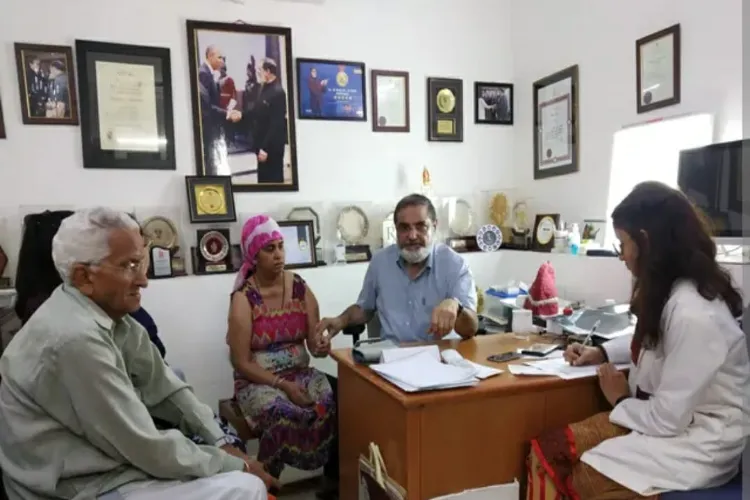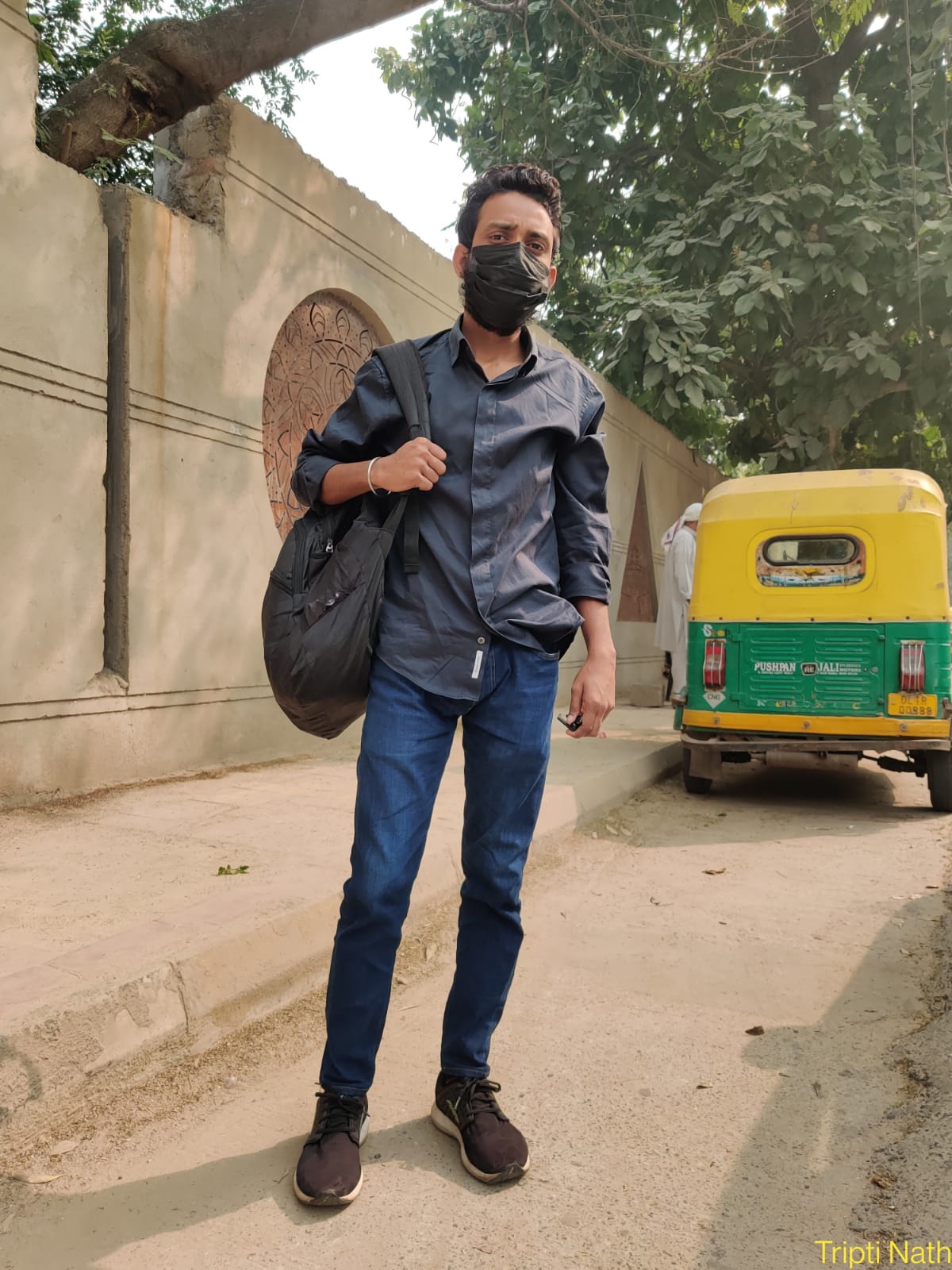
Tripti Nath/New Delhi
Unabated stubble burning has undone controlled Diwali fireworks in the National Capital Region.
Delhi’s Lieutenant Governor has said that stubble burning in Punjab has once again converted Delhi into a gas chamber but the Punjab government will take a full year to fix the problem.
As the Air Quality Index deteriorated further from 418 on Thursday night to 472 in the "severe" category on Friday morning, Delhi LG V.K. Saxena said that the stubble burning in Punjab has once again converted the national capital into a gas chamber. In a formal communication to Punjab Chief Minister Bhagwant Mann, the Delhi LG said, "Request you to undertake urgent and substantive measures to control Parali (stubble) burning in Punjab, which has converted the national capital once again into a gas chamber.’’
Stubble burning contributed around 34 percent to Delhi's PM 2.5 concentration, according to SAFAR (System of Air Quality and Weather Forecasting and Research), Ministry of Earth Sciences.
At a Press conference on Friday with Delhi Chief Minister Arvind Kejriwal, the Chief Minister of Punjab agreed that there is more quantity of stubble due to bumper paddy crops in Punjab and promised to find a solution by November next year. Both promised that Delhi will not face pollution next year.
On the other hand, Haryana has reported a thirty percent decline in incidents of stubble burning in the last year.
Delhi roads on Friday bore testimony to the ordeal of the residents as drivers of big and small vehicles turned on headlights to cope with reduced visibility caused by deteriorating air quality. The situation was no better in Noida and Gurugram.
According to SAFAR, the AQI of Delhi's neighbouring cities of NOIDA jumped at 562 under "severe" category. Gurugram's AQI jumped to 539.
As haze eclipsed the bright November sun, residents of Delhi and adjoining areas began complaining of breathing discomfort, extreme itching in eyes, flu and pain in throat. Clinics and hospitals are reporting an increase in patients coming for treatment of asthma, choking and watering from the eyes.
Professor (Dr) Mohsin Wali, former Physician to President Pranab Mukherjee told Awaz The Voice that in the last five days, he has examined 50 asthma and heart patients. “ The air quality has progressively deteriorated in the last five days and this triggered lung infections. Asthma patients who came to my clinic required high frequency of inhalation. Some patients had cough with sputum and needed antibiotics. Heart patients had cough."
A senior consultant at Sir Ganga Ram Hospital, Dr Wali says that persons who suffered COVID need to be extra cautious as they will be more prone to infections. He said that children, pregnant women and the elderly must be extra cautious. “Smokers too are at heightened risk.’’
Dr Wali said that surprisingly, the day after Diwali showed very clear air in Delhi. “ After that, the air quality progressively deteriorated due to stubble burning in Punjab.’’
People even brought out masks to protect their lung health as Delhi’s air quality continued in the "severe" category for the second consecutive day on Friday.
Likewise, Dr Mahipal Sachdev, Chairman and Managing Director of the Centre for Sight Group of eye hospitals, told this correspondent that the eyes are an exposed part of the body and when they come in contact with the air, it causes allergies. “ Over the last couple of years, people have been coming to us with itchy, watery, and sore eyes. Over a period of time, the quality of tear film is also going down and this causes dry eyes. These problems peak around this time of the year. In my OPD (Out Patient Department), 20 to 30 percent of patients have these problems. Today, I examined a 13-year-old from Sonipat (Haryana) who complained of itching in the eyes and intolerance to light. We gave him cold compressors and anti-allergic. “
Dr Sachdev says that people must wear sunglasses and use lubricant eye drops to prevent dry eyes.
As Delhi is on the brink of a public health emergency, the authorities have begun announcing measures hurriedly. Commission of Air Quality Management on Thursday directed authorities to ban the plying of four-wheeled diesel light motor vehicles in the city and adjoining NCR districts and the entry of trucks into the national capital as part of anti-pollution measures under the final stage of the Graded Response Action Plan (GRAP).
The Delhi government has ordered that half of its employees will work from home. Private offices have also been asked to make their employees work from home.
In a grim reminder of COVID times. all primary schools in Delhi will shut from Saturday. Schools in Noida and Greater Noida on Thursday were asked to hold online classes for students up to Class 8 till November 8, according to an official order.
The schools have also been asked to hold classes for students of Class 9 to 12 online as far as possible, said the order issued by Gautam Buddh Nagar's District Inspector of Schools (DIOS) Dharmveer Singh.. As per SAFAR, stubble burning contributed around 34 percent to Delhi's PM 2.5 concentration.
It was the National Commission for Protection of Child Rights that was the first to have asked the Delhi government to consider closing down schools.
The AQI between zero and 50 is considered "good"; 51 and 100 "satisfactory"; 101 and 200 "moderate"; 201 and 300 "poor"; 301 and 400 "very poor"; and 401 and 500 "severe".
The Supreme Court on Friday agreed to examine on November 10 a plea seeking urgent steps in connection with air pollution in Delhi. While mentioning the matter before a bench headed by Chief Justice U.U. Lalit, the lawyer pointed out that air pollution in the capital is in severe category due to increase in stubble burning. The top court said it agrees that the matter requires intervention and scheduled the plea for hearing on November 10.
Meanwhile, the National Human Rights Commission said that it is alarmed over the increasing air pollution in Delhi. Dissatisfied with the steps taken to control pollution, the NHRC has asked chief secretaries of Delhi, Haryana, Punjab and Uttar Pradesh to appear before the Commission on November 10.
 Kartik Mandal
Kartik Mandal
Delhi Chief Minister Arvind Kejriwal defended his government thus. “ Air pollution is a north India problem. AAP, the Delhi government, or the Punjab government are not solely responsible. The centre should come forward and help in overcoming this problem of air pollution in north India.
Kejriwal said that his government is mulling whether the odd-even scheme for vehicles should be implemented.
Kartik Mandal, a 22-year-old student of Architecture, wears a mask to his architect firm in Defence Colony every day. Son of a heart surgeon, Kartik says that he lives in Civil Lines in north Delhi and commutes by metro. “ I have been wearing a mask from my school days in Patna. I have to protect myself.’’
Unfortunately, not all citizens are as health conscious. Only three out of ten road users in Delhi were seen wearing masks on the stretch between South Moti Bagh and Defence Colony on Friday forenoon.
